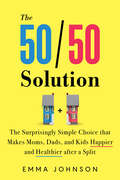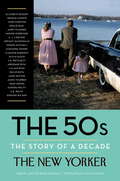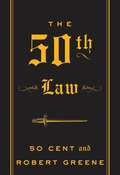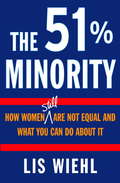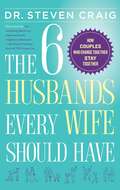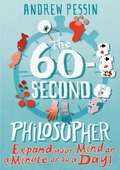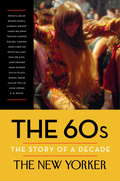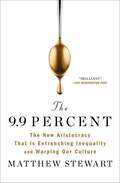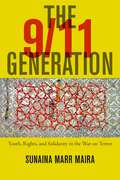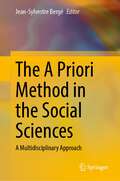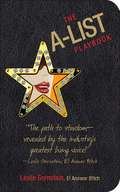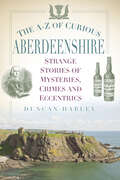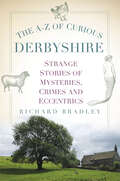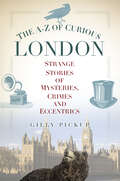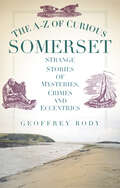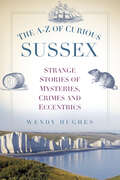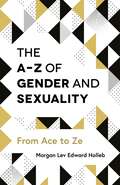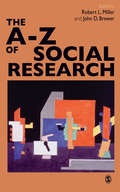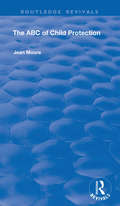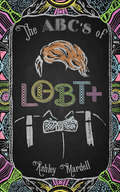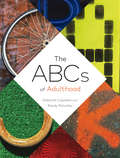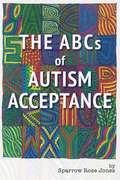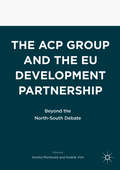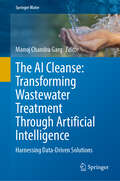- Table View
- List View
The 50/50 Solution: The Surprisingly Simple Choice that Makes Moms, Dads, and Kids Happier and Healthier after a Split
by Emma JohnsonThere is one proven method for happier kids, more involved dads, and less stressed-out moms after divorce—50/50 custodyIt's hard for everyone when parents split up—but the end of living together doesn't need to mean the end of a functional family. Part of the reason divorces are so traumatic for the kids involved is because of our child custody system, which truly sets everyone up for failure. Throughout the country, the default arrangement is for Mom to get majority time with the kids (and most of the responsibility of caring for them), for Dad to become an occasional visitor (and perhaps saddled with massive child support payments), and for the kids to lose the stability, structure and confidence of knowing they have two equally committed, loving parents. But it doesn't have to be this way!In The 50/50 Solution, creator of the Wealthy Single Mommy community Emma Johnson showcases the robust research proving that, in the vast majority of cases, equal timesharing is the best outcome for everyone in a family where the adults no longer live together. The 50/50 Solution will show you that equal parenting time leads to:Better physical, emotional, and mental health for children of divorceHigher career earnings for single mothersFathers who are more engaged and whose rights as parents are preservedFar less parental and legal conflictA progressive, forward-thinking cultural norm that promotes gender and racial equality for all families, regardless of their configurationA few states have already adopted 50/50 custody as the default arrangement, and several more are poised to follow. Equal parenting time is the custody framework of the future, and The 50/50 Solution shows readers how it helps our families and communities thrive.
The 50s: The Story of a Decade
by Truman Capote Elizabeth Bishop David Remnick Henry Finder The New Yorker MagazineIncluding contributions by Elizabeth Bishop * Truman Capote * John Cheever * Roald Dahl * Janet Flanner * Nadine Gordimer * A. J. Liebling * Dwight Macdonald * Joseph Mitchell * Marianne Moore * Vladimir Nabokov * Sylvia Plath * V. S. Pritchett * Adrienne Rich * Lillian Ross * Philip Roth * Anne Sexton * James Thurber * John Updike * Eudora Welty * E. B. White * Edmund Wilson And featuring new perspectives by Jonathan Franzen * Malcolm Gladwell * Adam Gopnik * Elizabeth Kolbert * Jill Lepore * Rebecca Mead * Paul Muldoon * Evan Osnos * David Remnick The 1950s are enshrined in the popular imagination as the decade of poodle skirts and "I Like Ike." But this was also a complex time, in which the afterglow of Total Victory firmly gave way to Cold War paranoia. A sense of trepidation grew with the Suez Crisis and the H-bomb tests. At the same time, the fifties marked the cultural emergence of extraordinary new energies, like those of Thelonious Monk, Sylvia Plath, and Tennessee Williams. The New Yorker was there in real time, chronicling the tensions and innovations that lay beneath the era's placid surface. In this thrilling volume, classic works of reportage, criticism, and fiction are complemented by new contributions from the magazine's present all-star lineup of writers, including Jonathan Franzen, Malcolm Gladwell, and Jill Lepore. Here are indelible accounts of the decade's most exciting players: Truman Capote on Marlon Brando as a pampered young star; Emily Hahn on Chiang Kai-shek in his long Taiwanese exile; and Berton Roueché on Jackson Pollock in his first flush of fame. Ernest Hemingway, Emily Post, Bobby Fischer, and Leonard Bernstein are also brought to vivid life in these pages. The magazine's commitment to overseas reporting flourished in the 1950s, leading to important dispatches from East Berlin, the Gaza Strip, and Cuba during the rise of Castro. Closer to home, the fight to break barriers and establish a new American identity led to both illuminating coverage, as in a portrait of Thurgood Marshall at an NAACP meeting in Atlanta, and trenchant commentary, as in E. B. White's blistering critique of Senator Joe McCarthy. The arts scene is here recalled in critical writing rarely reprinted, whether it's Wolcott Gibbs on My Fair Lady, Anthony West on Invisible Man, or Philip Hamburger on Candid Camera. The reader is made witness to the initial response to future cultural touchstones through Edmund Wilson's galvanizing book review of Doctor Zhivago and Kenneth Tynan's rapturous response to the original production of Gypsy. As always, The New Yorker didn't just consider the arts but contributed to them. Among the audacious young writers who began publishing in the fifties was one who would become a stalwart for the magazine in both fiction and criticism for fifty-five years: John Updike. Also featured here are great early works from Philip Roth and Nadine Gordimer, as well as startling poems by Theodore Roethke and Anne Sexton, among others. Completing the panoply are insightful and entertaining new pieces by present day New Yorker contributors examining the 1950s through contemporary eyes. The result is a vital portrait of American culture as only one magazine in the world could do it.From the Hardcover edition.
The 50th Law (The\robert Greene Collection #1)
by Robert Greene 50 CentA hip hop icon joins forces with the best-selling author of The 48 Laws of Power to write a bible for success in life and work living by one simple principle: fear nothing.
The 51% Minority: How Women Still Are Not Equal And What You Can Do About It
by Lis Wiehl“Lis Wiehl tells us where the law protects us, and where it is letting us down. And as a bonus she gives us the tools to make change happen! If you care about where we are going, you have to read this book. ” –Rita Cosby, Emmy Award-winning TV host Women make up 51% of the American population, yet still aren’t treated equally to men in areas that matter most. In this provocative new book, Lis Wiehl, one of the country’s top federal prosecutors, reveals the legal and social inequalities women must face in their daily lives–and provides a “Tool Box” for dealing with a variety of issues. From boardroom to courtroom, from pregnancy to contraception, from unequal pay to domestic violence, women are more often than not handed the short end of the stick. • A woman earns seventy-three cents for every dollar a man makes. • The law labels pregnancy a “disability. ” • Domestic violence remains the single biggest threat of injury to women in America. • The federal government continues to increase funding for abstinence-only education, even though it’s proven to put our daughters at greater risk for unwanted pregnancies and sexually transmitted diseases. • Health insurance plans are more likely to cover Viagra prescriptions than birth control pills. What’s worse, we’re also weighed down by a myriad of troubling attitudes: The media bombard us with images of young, perfect-bodied women; acid-tongued commentators label us “feminazi” if we try to claim equal treatment; and the current chief justice of the Supreme Court has a history of opposing legislative and legal attempts to strengthen women’s rights, and questions “whether encouraging homemakers to become lawyers contributes to the common good. ” Why are powerful women viewed with consternation while powerful men instill respect? Why is it that for every ten men in an executive, decision-making role in this country, there is only one woman in that same role? Why do our federal courts continue to be stacked with male judges even though women receive more than half of all law degrees? And why shouldn’t a woman be president? Enough! Women are not equal in our society or under our laws and the remedy is quite simple: Besides being the majority of the population, we also control the economy, spending 80 percent of every discretionary dollar, and given that 54 percent of voters are female, we can swing an election. With our numbers we can do something about it. This is a critical moment: We can either take the road toward equality or allow ourselves to be driven further away from fair treatment. The 51% Minority is a clarion call to the silent majority to take a stand . . . before it’s too late. From the Hardcover edition.
The 6 Husbands Every Wife Should Have
by Steven Craig"You're not the person I married--you've changed!""I'm not the one who changed, you did!" Throughout his career as a marriage counselor, Dr. Steven Craig has heard those accusations repeated by couples over and over, reflecting a dangerous belief common to many strained relationships--the belief that change should be avoided at all costs. And yet the truth is as striking as it is straightforward: marriages don't fail when people change; they fail when people don't change.In The 6 Husbands Every Wife Should Have, Dr. Craig divides the typical marriage into six stages, outlining the common misconceptions and opportunities for growth at each stage. From the earliest stage--becoming the right person for one's spouse in the new marriage--to thinking and acting as a team and thereafter adjusting to the dynamics of parenthood, caring for older children and elderly parents, adapting to the empty nest, and, finally, growing into the golden years as a dependable companion, 6 Husbands shows how a successful marriage, far from being dependent on finding the right person, actually depends on the husband and wife becoming the right people. Using Dr. Craig's communication tools, checklists, and assessments designed to inspire change, couples will learn who they need to become in order to support each other at every stage of their life together, and they will also learn how to create a road map for getting there.As Dr. Craig says, "A marriage isn't a marathon; it's a decathlon. . . . Success in a marriage, as in a decathlon, is determined by how well one achieves in each individual event, not simply by getting to the finish line." With flexibility and awareness as watchwords, The 6 Husbands Every Wife Should Have shows couples not only the skills they will need to succeed but how and when to apply those skills in order to win the race--together.
The 60-Second Philosopher: Expand your Mind on a Minute or So a Day!
by Andrew PessinPhilosophy means "love of knowledge" in Greek. Unfortunately, as much as we all love knowledge, we don't all have the time to spend acquiring it! This fabulous little book provides the perfect antidote. Split into 60 one-minute chapters, Andrew Pessin offers you a snippet of philosophical wisdom everyday, giving you something to think about on your coffee break. From time travel and morality, to happiness and freedom, Pessin is bound to entertain you with his razor-sharp wit. The perfect way to hone your mental faculties ,The Sixty-Second Philosopher will delight aspiring thinkers everywhere! Andrew Pessin is Chair of Philosophy at Conneticut College. He is the author of Gray Matters: An Introduction to the Philosophy of Mind and has appeared several times on the David Letterman show as "The Genius".
The 60s: The Story of a Decade
by Hannah Arendt David Remnick Henry Finder The New Yorker Magazine Renata AdlerThe third installment of a fascinating decade-by-decade series, this anthology collects historic New Yorker pieces from the most tumultuous years of the twentieth century--including work by James Baldwin, Pauline Kael, Sylvia Plath, Roger Angell, Muriel Spark, and John Updike--alongside new assessments of the 1960s by some of today's finest writers. Here are real-time accounts of these years of turmoil: Calvin Trillin reports on the integration of Southern universities, E. B. White and John Updike wrestle with the enormity of the Kennedy assassination, and Jonathan Schell travels with American troops into the jungles of Vietnam. The murder of Martin Luther King, Jr., the fallout of the 1968 Democratic Convention, the Soviet invasion of Czechoslovakia, the Six-Day War: All are brought to immediate and profound life in these pages. The New Yorker of the 1960s was also the wellspring of some of the truly timeless works of American journalism. Truman Capote's In Cold Blood, Rachel Carson's Silent Spring, Hannah Arendt's Eichmann in Jerusalem, and James Baldwin's The Fire Next Time all first appeared in The New Yorker and are featured here. The magazine also published such indelible short story masterpieces as John Cheever's "The Swimmer" and John Updike's "A & P," alongside poems by Sylvia Plath and Anne Sexton. The arts underwent an extraordinary transformation during the decade, one mirrored by the emergence in The New Yorker of critical voices as arresting as Pauline Kael and Kenneth Tynan. Among the crucial cultural figures profiled here are Simon & Garfunkel, Tom Stoppard, Bob Dylan, Allen Ginsberg, Cassius Clay (before he was Muhammad Ali), and Mike Nichols and Elaine May. The assembled pieces are given fascinating contemporary context by current New Yorker writers, including Jill Lepore, Malcolm Gladwell, and David Remnick. The result is an incomparable collective portrait of a truly galvanizing era.
The 9.9 Percent: The New Aristocracy That Is Entrenching Inequality and Warping Our Culture
by Matthew StewartA scorching, trenchant, analysis of how the wealthiest group in American society is making life miserable for everyone—including themselves.In 21st century America, the top 0.1% of the wealth distribution have walked away with the big prizes even while the bottom 90% have lost ground. What&’s left of the American Dream has taken refuge in the 9.9% that lies just below the tip of extreme wealth. Collectively, the members of this group control more than half of the wealth in the country—and they are doing whatever it takes to hang on to their piece of the action in an increasingly unjust system. They log insane hours at the office and then turn their leisure time into an excuse for more career-building, even as they rely on an underpaid servant class to power their economic success and satisfy their personal needs. They have segregated themselves into zip codes designed to exclude as many people as possible. They have made fitness a national obsession even as swaths of the population lose healthcare and grow sicker. They have created an unprecedented demand for admission to elite schools and helped to fuel the dramatic cost of higher education. They channel their political energy into symbolic conflicts over identity in order to avoid acknowledging the economic roots of their privilege. And they have created an ethos of &“merit&” to justify their advantages. They are all around us. In fact, they are us—or what we are supposed to want to be. In The 9.9 Percent, Matthew Stewart argues that a new aristocracy is emerging in American society and it is repeating the mistakes of history. It is entrenching inequality, warping our culture, eroding democracy, and transforming an abundant economy into a source of misery. He calls for a regrounding of American culture and politics on a foundation closer to the original promise of America.
The 9/11 Generation: Youth, Rights, and Solidarity in the War on Terror
by Sunaina Marr MairaExplores how young people from communities targeted in the War on Terror engage with the “political,” even while they are under constant scrutiny and surveillance Since the attacks of 9/11, the banner of national security has led to intense monitoring of the politics of Muslim and Arab Americans. Young people from these communities have come of age in a time when the question of political engagement is both urgent and fraught.In The 9/11 Generation, Sunaina Marr Maira uses extensive ethnography to understand the meaning of political subjecthood and mobilization for Arab, South Asian, and Afghan American youth. Maira explores how young people from communities targeted in the War on Terror engage with the “political,” forging coalitions based on new racial and ethnic categories, even while they are under constant scrutiny and surveillance, and organizing around notions of civil rights and human rights. The 9/11 Generation explores the possibilities and pitfalls of rights-based organizing at a moment when the vocabulary of rights and democracy has been used to justify imperial interventions, such as the U.S. wars in Iraq and Afghanistan. Maira further reconsiders political solidarity in cross-racial and interfaith alliances at a time when U.S. nationalism is understood as not just multicultural but also post-racial. Throughout, she weaves stories of post-9/11 youth activism through key debates about neoliberal democracy, the “radicalization” of Muslim youth, gender, and humanitarianism.
The A Priori Method in the Social Sciences: A Multidisciplinary Approach
by Jean-Sylvestre BergéThis edited volume takes a multidisciplinary look at the philosophical concept of a priori. Placing social sciences at the heart of the discussion, this book establishes a dialogue between various disciplines and the different postulates, presuppositions, prejudices, paradigms, beliefs, commonplaces, biases or emotions that forge their theoretical and practical constructs. The book is divided into three parts. Chapters in Part I lay the foundations of a new antecedent approach that revisits the classical approach to a priori and its relationships with law and philosophy. Chapters in Part II extend the analysis to economics and management, on such key topics as blockchain technology, labor, health insurance and innovation. Finally, chapters in Part III turn to anthropology and sociology, to reconsider the core methods of these different disciplines and to nourish reflection on the basis of new working hypotheses.
The A-List Playbook: How to Survive Any Crisis While Remaining Wealthy, Famous, and Most Importantly, Skinny
by Leslie GornsteinIf Hollywood is a sport, you want Leslie Gornstein on your team and this playbook in your ridiculously-oversized leather purse. The A-List Playbook is the perfect introduction for newcomers to the exciting alternate reality of the celebrity lifestyle. A must-read for anyone who cares why so many celebs are sporting "bumps," or whether they are really "just like us," this guide-nay, rulebook-lays down the law on what you need to know to play Hollywood in a simple and concise manner. (And if you don't care? You care. It's a celebrity culture; if you can't embrace it, mock it!)The voice is intelligently hilarious, and everyone's favorite Answer Bitch has been around the boulevard once or twice. (How else would she have scored a column on E! and a radio show on Sirius?) For the first time on the written page, she reveals the secrets to celebrity life. Here's everything you need to know to hire and fire assistants, develop a loyal entourage, get free makeup, and keep those inaccurate cellulite-inclusive photographs out of the press. With timeless anecdotes, razor sharp quotes, and illustrative charts, The A-List Playbook is the smart girl's response to People.
The A-Z of Curious Aberdeenshire: Strange Stories of Mysteries, Crimes and Eccentrics
by Duncan HarleyDuncan Harley takes the reader on a grand tour of the curious and the bizarre, the strange and the unusual from Aberdeenshire’s past. Read about the Beatles’ first, and almost their last, tour of the North-east, the Deeside artist who tended plaster sheep, and the strange tale of the Typhoid Queen. Learn about Hitler’s secret bunker at Stonehaven, the doomed Marquis of Montrose, and the mysterious Mound of Death at Inverurie. Along the way you’ll also meet scandalous residents, determined inventors, and Royal personages galore. The A-Z of Curious Aberdeenshire is guaranteed to enthrall both residents and visitors alike.
The A-Z of Curious Derbyshire: Strange Stories of Mysteries, Crimes and Eccentrics
by Richard BradleyDERBYSHIRE has long been a popular tourist destination. For centuries the crowds have flocked to fashionable towns like Buxton, and a large swathe of the county was incorporated into the UK’s first National Park in 1951. But below these surface level attractions lie stranger aspects of county life, which tourists don’t get to see. In The A-Z of Curious Derbyshire you will learn about local traditions from hen racing to well dressing, meet local eccentrics like the Matlock Amazon and the Wild Man of Bakewell, and discover sites mystifyingly absent from the local tourist board brochures, including the Devil’s Shovel Full and the Buxton Shoe Tree.
The A-Z of Curious London: Strange Stories of Mysteries, Crimes and Eccentrics (A-Z of Curious)
by Gilly PickupSpooky, gruesome, weird but true things about one of the world’s greatest cities come alive in The A-Z of Curious London. Discover London’s tiniest house, a 4,000-year-old mouse made from Nile clay, and have a giggle at things people leave on London’s transport (including false teeth, a human skull and a park bench - yes, really.) Why did a dentist keep his dead wife on view in a shop window? Where did a shopkeeper murder 150 customers? Which Queen showed her bosom to an Ambassador? Why was a man arrested for wearing a top hat? In the City proper, why is no thoroughfare called a road? To sum up, eccentrics, legends, folklore, murders, scandals, ghosts, incredible characters and oodles of wow factor, it’s all here.
The A-Z of Curious Somerset: Strange Stories of Mysteries, Crimes and Eccentrics (A-Z of Curious)
by Geoffrey BodyThis book draws on the long and unique heritage of the county of Somerset, bringing to life seventy of the little known but fascinating and unusual aspects of a much-loved area. It tells of body-snatchers and bewitchment; crime and conflict; lepers and lighthouses; songs and words; heroes and villains – this is book is of and for the curious. Its accounts of larger-than-life episodes from Somerset activity, locations and people take the reader on a near-unbelievable exploration of local human behaviour and idiosyncrasy. Richly illustrated, this book is great for dipping into, but can equally be enjoyed from cover to cover.
The A-Z of Curious Sussex: Strange Stories of Mysteries, Crimes and Eccentrics
by Wendy HughesIn this engaging book, Wendy Hughes takes you on a grand tour of the curious and bizarre, the strange and the unusual from Sussex’s past. Read about the Alfriston Star – the hostelry for medieval package tours with its unusual ship’s figurehead, the Russian memorial to Finnish soldiers, Crazy Jack who couldn’t stop building and who is buried in a pyramid, the inventor of vapour baths and the lady who fooled the army. Along the way you will meet scandalous residents, inventors, and smugglers galore. The A-Z of Curious Sussex is guaranteed to fascinate both resident and visitor alike.
The A-Z of Gender and Sexuality: From Ace to Ze
by Morgan Lev HollebThere can be confusion around the appropriate terminology for trans and queer identities, even within the trans community itself. As language is constantly evolving, it can be especially difficult to know what to say. As a thorough A-Z glossary of trans and queer words from 'ace' to 'xe', this dictionary guide will help to dispel the anxiety around using the "wrong" words, while explaining the weight of using certain labels and providing individuals with a vocabulary for personal identification.Having correct and accurate terminology to describe oneself can be empowering, especially with words and phrases that describe gender identity, sexuality, sexual orientation, as well as slang relevant to LGBTQ+ rights and anti-discrimination, queer activism, gender-affirming healthcare and psychology. Written in a traditional A-Z glossary style, this guide will serve as a quick reference for looking up individual words, as well as an in-depth look at trans history and culture.
The A-Z of Social Research: A Dictionary of Key Social Science Research Concepts
by Robert L. Miller John D. Brewer`A detailed and valuable addition to the literature that will be a very useful resource for lecturers, as well as having a wide appeal among students′ - Tim May, University of Salford Have you ever wondered what a concise, comprehensive book providing critical guidance to the whole expanse of social science research methods and issues might look like? The A-Z is a collection of 94 entries ranging from qualitative research techniques to statistical testing and the practicalities of using the Internet as a research tool. Alphabetically arranged in accessible, reader-friendly formats, the shortest entries are 800 words long and the longest are 3000. Most entries are approximately 1500 words in length and are supported by suggestions for further reading. The book: - Answers the demand for a practical, fast and concise introduction to the key concepts and methods in social research - Supplies students with impeccable information that can be used in essays, exams and research projects - Demystifies a field that students often find daunting This is a refreshing book on social research methods, which understands the pressures that modern students face in their work-load and seeks to supply an authoritative study guide to the field. It should fulfil a long-standing need in undergraduate research methods courses for an unpatronising, utterly reliable aid to making sense of research methods.
The ABC of Child Protection (Routledge Revivals)
by Jean MooreFirst published in 1992, this volume, a completely new work and companion to the best seller The ABC of Child Abuse Work, keeps alive the theme of the child’s perspective. This new book examines four faces of abuse in detail: physical abuse, children caught up in marital violence and the much neglected subject of neglect, so often ignored in many texts. Because of the high anxiety that surrounds sexual abuse, particular attention has been paid to this subject with a step-by-step interdisciplinary approach for working with the sex offender, the non-offending parent and the sexually abused child. There is also a section devoted to understanding and working with female sex offenders. The painful stresses experienced by the worker are not forgotten and emphasis is put upon the specific skills required in child protection work. There is a lively chapter on face-to-face work with abused children the complexities of child protection conferences are helpfully analysed with particular reference to the attendance of parents and children. The black perspective is given prominence with contributions from Emmanuel Okine and David Divine. A chapter by Caroline Ball describes the contents and implications of the 1989 Children Act. Issues relating to racism, sexism, classism, ageism and disabilityism are honestly tackled. The ABC of Child Protection aims to continue the development of a better service for abused children and their families. It serves as a guide to students on qualifying courses and for experienced professionals who wish to extend their practice in this area.
The ABC's of LGBT+: (gender Identity Book For Teens, Teen And Young Adult Lgbt Issues)
by Ashley MardellThe YouTube star presents a personal, approachable, and informative guide for anyone seeking a deeper understanding of gender and sexual identity. The ABCs of LGBT+ is essential reading for questioning teens, teachers or parents looking for advice, or anyone who wants to learn how to talk about gender and sexual identity. In this volume, popular vlogger Ash Mardell, who embraces all pronouns, answers your questions about the post-binary world of the twenty-first century. With in-depth definitions, personal anecdotes, helpful infographics, resources, and more, Mardell lets readers know that it really does get better when we are empowered by information and understanding. In Mardell&’s own words, "This book is also for allies and LGBT+ people simply looking to pack in some extra knowledge . . . a critical part of acceptance. Learning about new identities broadens our understanding of humanity, heightens our empathy, and allows us different, valuable perspectives.&” Topics covered include: · LGBT and LGBTQIA+ · Gender identity · Sexual identity · Teens in a binary world · The LGBT family and more
The ABCs of Adulthood: An Alphabet of Life Lessons
by Deborah Copaken Randy PolumboHere's a book of wit and wisdom that's perfect for any "welcome to the adult world" moment. From New York Times bestselling author Deborah Copaken and noted sculptor Randy Polumbo come 26 genuine and funny bits of advice as surprising as they are sensible. From "A is for Anger" through "Z is for Zzzzzzz," each entry is paired with the authors' street-smart photography of the matching alphabet letter to create a savvy ebook. Based on a viral article written by Copaken when her own firstborn left for college, The ABCs of Adulthood is a delightful, worldly riff on learning your ABCs all over again.
The ABCs of Autism Acceptance
by Sparrow Rose JonesIn The ABCs of Autism Acceptance, Sparrow takes us through a guided tourof the topics most central to changing the way that autism is perceived, toremove systemic barriers to access that have traditionally been barriers toAutistic participation in some sectors of society. They also take us through thebasics of Autistic culture, discussing many of its major features and recentdevelopments with a sense of history and making the current state of theconversation around this form of neurodivergence clear to those who are new toit, whether they are Autistic themselves or a friend/family member looking forresources to help themselves support the Autistic people in their lives more fully.
The ACP Group and the EU Development Partnership
by Annita Montoute Kudrat VirkThis book constitutes a systematic and critical assessment of the nature, evolution, and prospects of the development partnership between the 79-member African, Caribbean, and Pacific (ACP) group of states and the 28-member European Union (EU). A core theme that runs through the work is that the ACP's partnership with the EU remains an important framework for addressing development challenges in the African, Caribbean, and Pacific regions, but needs to adapt to changes in the global political economy, as well as internal developments in both the ACP and the EU, to sustain its relevance and effectiveness. This is crucial for the ACP group, in particular, given its origins in, and core focus on, development cooperation with Europe. The authors in this volume examine the history of the ACP-EU partnership since 1975; the EU's relationship with the African, Caribbean, and Pacific regions individually; ACP experiences with economic partnership agreements with the EU; and new political issues, in particular, security, migration, and diasporas. Shedding light on the future prospects of this relationship, this book will be of interest to both scholars and policymakers working on the ACP-EU relationship and related development issues, including trade, aid, security, and migration.
The ACTA and the Plurilateral Enforcement Agenda
by Pedro Roffe Xavier SeubaThe Anti-Counterfeiting Trade Agreement (ACTA) is the most important effort undertaken to lay down a plurilateral legal framework for the enforcement of intellectual property rights. With the view to learn more about the origins of this treaty, the process leading to its conclusion and its implications for law making in this field, The ACTA and the Plurilateral Enforcement Agenda: Genesis and Aftermath analyses in great depth both the context and the content of the agreements. In order to attain this objective, a large and diverse group of experts - renowned scholars, policy makers and civil society actors - who represent different perspectives on the necessary balance between intellectual property enforcement and other economic and social interests have been gathered together. This book is the most comprehensive analysis of ACTA, and of its relation with ongoing initiatives to improve enforcement of intellectual property and norms pertaining to a range of international legal regimes, conducted so far.
The AI Cleanse: Harnessing Data-Driven Solutions (Springer Water)
by Manoj Chandra GargThis groundbreaking book goes beyond conventional approaches and explores how AI is revolutionizing the field of wastewater treatment, offering innovative solutions to pressing challenges. "The AI Cleanse" takes you on a captivating journey through the convergence of AI and wastewater treatment, revealing the potential for enhanced efficiency, effectiveness, and sustainability. From optimizing treatment processes to intelligent monitoring and fault detection, this book showcases how AI-driven technologies can reshape the way we approach wastewater treatment.Gain a comprehensive understanding of the basics of wastewater treatment and the limitations of traditional methods. Explore the practical applications of AI, such as data acquisition and analysis, process optimization, and resource recovery. Learn about cutting-edge technologies, emerging trends, and future directions in the field.Written in a reader-friendly style, "The AI Cleanse" bridges the gap between theoretical knowledge and practical implementation. Packed with real-world examples, case studies, and insights from experts in the field, this book equips researchers, professionals, and students with the knowledge needed to harness the full potential of AI in wastewater treatment.If you are passionate about environmental preservation, sustainable practices, and the power of technology, "The AI Cleanse" is your guide to unlocking the transformative potential of artificial intelligence in wastewater treatment. Embrace a cleaner future and be at the forefront of this revolution in the field.
